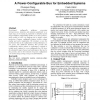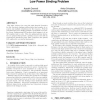ISLPED
1999
ACM
14 years 4 months ago
1999
ACM
Gating the clock is an important technique used in low power design to disable unused modules of a circuit. Gating can save power by both preventing unnecessary activiiy in the lo...
ISLPED
1999
ACM
14 years 4 months ago
1999
ACM
A recent trend in low power design has been the employment of reduced precision processing methods for decreasing arithmetic activity and average power dissipation. Such designs c...
ISCAS
2002
IEEE
14 years 5 months ago
2002
IEEE
Pre-designed configurable platforms, possessing microprocessors, memories, and numerous peripherals on a single chip, are increasing in popularity in embedded system design. Platf...
GLVLSI
2002
IEEE
14 years 5 months ago
2002
IEEE
We present a low-power sine-output Direct Digital Frequency Synthesizer (DDFS) realized in 0.18 µm CMOS that achieves 60 dBc spectral purity from DC to the Nyquist frequency. No ...
ISLPED
2003
ACM
14 years 5 months ago
2003
ACM
Low power technology is impacting our society by creating the newly emerging digital consumer market, which leads to the nomadic life-style. In this paper, historical review of th...
ISLPED
2003
ACM
14 years 5 months ago
2003
ACM
The increasing prominence of portable systems and the need to limit power consumption and hence, heat dissipation in very high density VLSI chips have led to rapid and innovative ...
ISLPED
2003
ACM
14 years 5 months ago
2003
ACM
This paper proposes two very fast graph theoretic heuristics for the low power binding problem given fixed number of resources and multiple architectures for the resources. First...
CASES
2003
ACM
14 years 5 months ago
2003
ACM
The proliferation of computing technology to low power domains such as hand–held devices has lead to increased interest in portable interface technologies, with particular inter...
ASAP
2003
IEEE
14 years 5 months ago
2003
IEEE
The register file is a power-hungry device in modern architectures. Current research on compiler technology and computer architectures encourages the implementation of larger dev...
ISLPED
2004
ACM
14 years 5 months ago
2004
ACM
In this paper we investigate the statistics of multiplier operands and identify two characteristics of their distribution that have important consequences for the design of low po...


